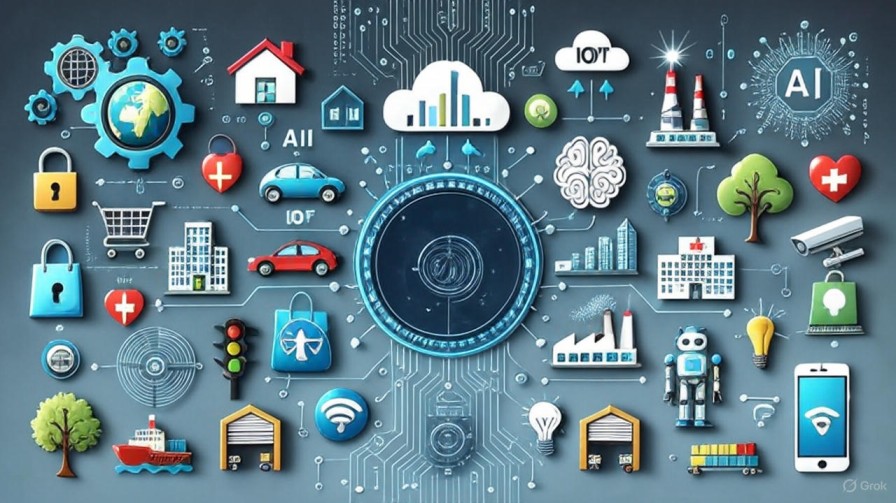Top IoT Companies Shaping the Intelligent, Connected Future in 2025

The Internet of Things is entering its most transformative phase yet, driven by breakthroughs in AI, edge computing, and secure connectivity. In 2025, several IoT companies—ranging from cloud giants to specialist industrial players—are leading this shift with next-generation platforms, devices, and automation systems. These companies are not only enabling smarter homes and factories but also reshaping how cities, transportation, and healthcare operate. Their innovations are setting the tone for a hyper-connected decade.
Background: IoT’s Rapid Shift from Connectivity to Intelligence
Over the past few years, IoT has transitioned from simple device connectivity to a more advanced ecosystem powered by AI-driven automation. With the rise of 5G networks, proliferation of sensors, and growing demand for real-time analytics, IoT has become essential across sectors—from manufacturing and logistics to energy, agriculture, and consumer electronics.
In 2025, the focus is no longer just on “connecting things,” but on making connected systems smarter, autonomous, and context-aware.
Key Players Leading IoT Innovation in 2025
1. Amazon Web Services (AWS) IoT
AWS continues to dominate with a comprehensive suite of IoT services for device management, edge processing, and industrial automation. Its integration of AI-driven analytics and secure cloud infrastructure makes it a top choice for large-scale deployments.
2. Microsoft Azure IoT
Azure IoT stands out for enterprise-grade solutions, especially in manufacturing and supply chain automation. Its seamless integration with Azure AI and digital twins helps industries simulate and optimize physical systems in real time.
3. Google Cloud IoT
Google leverages its AI and machine learning strengths to provide powerful IoT analytics tools. Its edge-cloud hybrid architecture supports low-latency applications in sectors like retail, mobility, and energy.
4. Siemens MindSphere
A global leader in industrial IoT, Siemens MindSphere provides advanced tools for smart factories and industrial equipment monitoring. Its deep hardware-software integration helps manufacturers unlock predictive maintenance and operational efficiency.
5. Bosch IoT Suite
Bosch continues to excel in automotive and industrial IoT with solutions spanning connected mobility, smart home devices, and industrial automation. Its strong focus on security and hardware innovation strengthens its position in 2025.
6. Cisco IoT
Known for network infrastructure, Cisco leads in secure IoT connectivity solutions. With rising cyber risks, its focus on zero-trust architectures and resilient networks is critical for enterprise IoT adoption.
7. Xiaomi & Samsung (Consumer IoT Leaders)
Both companies dominate the consumer IoT ecosystem with smart home products, wearables, and AI-integrated home automation platforms. Their accessible pricing and massive product ecosystems drive global adoption.
Technical Explanation: What Makes IoT Smarter in 2025?
Today’s IoT systems combine sensors with embedded AI, allowing devices to analyze data locally (edge computing) before sending insights to the cloud. This reduces latency, boosts privacy, and enables faster decision-making—crucial for smart vehicles, industrial robots, and medical devices.
Think of it as moving from “devices that talk” to “devices that think.”
Implications: A More Connected and Autonomous World
- Homes become intelligent hubs with AI-powered appliances and smart energy management.
- Industries reduce downtime using predictive maintenance powered by IoT analytics.
- Cities adopt IoT for efficient traffic flow, energy savings, and public safety.
- Healthcare improves with remote monitoring and real-time patient alerts.
The economic impact is massive, with global IoT spending projected to grow significantly in the next few years.
Challenges & Limitations
Despite the progress, IoT still faces hurdles:
- Cybersecurity risks due to billions of connected devices
- Interoperability issues across vendors
- High deployment costs for large-scale industrial applications
- Data privacy concerns as more personal information gets collected
Addressing these challenges will be crucial for sustainable IoT growth.
Future Outlook
The next wave of IoT will see deeper integration with generative AI, robotics, 6G networks, and autonomous systems. Companies are expected to offer more self-healing networks, context-aware devices, and multi-cloud IoT architectures.
As devices become smarter and more efficient, IoT will continue to reshape industries and daily life in ways we’re only beginning to understand.
Conclusion
The top IoT companies of 2025 are not just connecting devices—they’re building an intelligent digital ecosystem that touches every part of modern life. Their innovations will define the next decade of automation, efficiency, and connected experiences.